
A wiki is a form of online hypertext publication that is collaboratively edited and managed by its own audience directly through a web browser. A typical wiki contains multiple pages that can either be edited by the public or limited to use within an organization for maintaining its internal knowledge base.
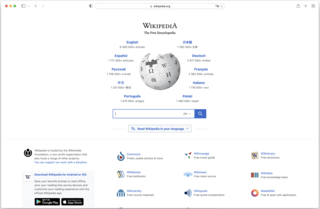
A web browser is an application for accessing websites. When a user requests a web page from a particular website, the browser retrieves its files from a web server and then displays the page on the user's screen. Browsers are used on a range of devices, including desktops, laptops, tablets, and smartphones. In 2020, an estimated 4.9 billion people have used a browser. The most-used browser is Google Chrome, with a 64% global market share on all devices, followed by Safari with 19%.

Clifford Alan Pickover is an American author, editor, and columnist in the fields of science, mathematics, science fiction, innovation, and creativity. For many years, he was employed at the IBM Thomas J. Watson Research Center in Yorktown, New York, where he was editor-in-chief of the IBM Journal of Research and Development. He has been granted more than 700 U.S. patents, is an elected Fellow for the Committee for Skeptical Inquiry, and is author of more than 50 books, translated into more than a dozen languages.

The White Rabbit is a fictional and anthropomorphic character in Lewis Carroll's 1865 book Alice's Adventures in Wonderland. He appears at the very beginning of the book, in chapter one, wearing a waistcoat, and muttering "Oh dear! Oh dear! I shall be too late!" Alice follows him down the rabbit hole into Wonderland. Alice encounters him again when he mistakes her for his housemaid Mary Ann and she becomes trapped in his house after growing too large. The Rabbit shows up again in the last few chapters, as a herald-like servant of the King and Queen of Hearts.
A rabbit hole is a rabbit burrow.

Ars Technica is a website covering news and opinions in technology, science, politics, and society, created by Ken Fisher and Jon Stokes in 1998. It publishes news, reviews, and guides on issues such as computer hardware and software, science, technology policy, and video games.

The red pill and blue pill are metaphorical terms representing a choice between the willingness to learn a potentially unsettling or life-changing truth by taking the "red pill" or remaining in the contented experience of ordinary reality with the "blue pill". The terms originate from the 1999 film The Matrix.

Alice Through the Needle's Eye: A Third Adventure for Lewis Carroll's Alice is a 1984 novel by Gilbert Adair that pays tribute to the work of Lewis Carroll through a further adventure of the eponymous fictional heroine, told in Carroll's surrealistic style.

Lewis Carroll's books Alice's Adventures in Wonderland (1865) and Through the Looking-Glass (1871) have been highly popular in their original forms, and have served as the basis for many subsequent works since they were published. They have been adapted directly into other media, their characters and situations have been appropriated into other works, and these elements have been referenced innumerable times as familiar elements of shared culture. Simple references to the two books are too numerous to list; this list of works based on Alice in Wonderland focuses on works based specifically and substantially on Carroll's two books about the character of Alice.

Alice in Wonderland is a dark ride in Fantasyland at Disneyland in Anaheim, California. Based on the 1951 animated Disney film of the same name, the attraction resides next to a second ride, the Mad Tea Party, based on a scene in that same adaptation.
Down the Rabbit Hole is a metaphor for adventure into the unknown, from its use in Alice's Adventures in Wonderland. It may also refer to:

RationalWiki is an online wiki which is written from a scientific skeptic, secular, and progressive perspective. Its stated goals are to "analyze and refute pseudoscience and the anti-science movement, document crank ideas, explore conspiracy theories, authoritarianism, and fundamentalism, and analyze how these subjects are handled in the media." It was created in 2007 as a counterpoint to the Christian fundamentalist Conservapedia after an incident in which some editors of Conservapedia were banned. RationalWiki has been described as liberal in contrast to Conservapedia.
Wikipedia Review is an Internet forum and blog for the discussion of Wikimedia Foundation projects, in particular the content and conflicts of Wikipedia. Wikipedia Review sought to act as a watchdog website, scrutinizing Wikipedia and reporting on its flaws. It provides an independent forum to discuss Wikipedia editors and their influence on Wikipedia content. At its peak, participants included current Wikipedia editors, former Wikipedia editors, users banned from Wikipedia, and people who had never edited. Though the site is still partially running, the last post was on 31 May 2012.
Google Sidewiki was a web annotation tool from Google, launched in September 2009 and discontinued in December 2011. Sidewiki was a browser extension that allowed anyone logged into a Google Account to make and view comments about a given website in a sidebar. Despite the name, the tool was not a collaborative wiki, though the comments were editable by the author.
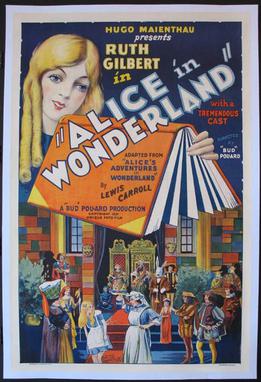
Alice in Wonderland (1931) is an independently made black-and-white Pre-Code American film based on Lewis Carroll's 1865 novel Alice's Adventures in Wonderland, directed by Bud Pollard, produced by Hugo Maienthau, and filmed at Metropolitan Studios in Fort Lee, New Jersey.

WikiPathways is a community resource for contributing and maintaining content dedicated to biological pathways. Any registered WikiPathways user can contribute, and anybody can become a registered user. Contributions are monitored by a group of admins, but the bulk of peer review, editorial curation, and maintenance is the responsibility of the user community. WikiPathways is originally built using MediaWiki software, a custom graphical pathway editing tool (PathVisio) and integrated BridgeDb databases covering major gene, protein, and metabolite systems. WikiPathways was founded in 2008 by Thomas Kelder, Alex Pico, Martijn Van Iersel, Kristina Hanspers, Bruce Conklin and Chris Evelo. Current architects are Alex Pico and Martina Summer-Kutmon.
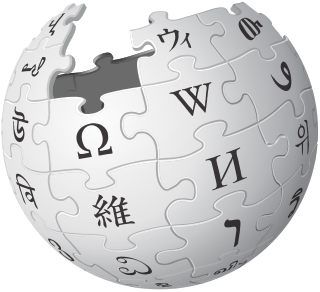
The following outline is provided as an overview of and a topical guide to Wikipedia:
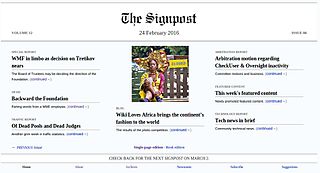
The Signpost is the Wikimedia movement's online newspaper. Managed by the volunteer community, it is published online with contributions from Wikimedia editors. The newspaper's scope includes the Wikimedia community and events related to Wikipedia, including Arbitration Committee rulings, Wikimedia Foundation issues, and other Wikipedia-related projects. It was founded in January 2005 by Wikipedian Michael Snow, who continued as a contributor until his February 2008 appointment to the Wikimedia Foundation's Board of Trustees.
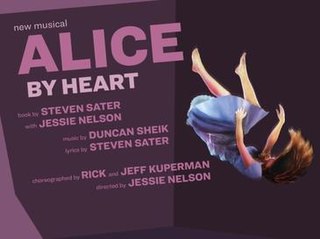
Alice by Heart is a musical with music by Duncan Sheik, lyrics by Steven Sater, and a book by Sater with Jessie Nelson. The musical is inspired by Lewis Carroll's 1865 novel Alice's Adventures in Wonderland and was originally presented by London's Royal National Theatre in 2012.

"Down the rabbit hole" is an English-language idiom or trope which refers to getting deep into something, or ending up somewhere strange. Lewis Carroll introduced the phrase as the title for chapter one of his 1865 novel Alice's Adventures in Wonderland, after which the term slowly entered the English vernacular. The term is usually used as a metaphor for distraction. In the 21st century, the term has come to describe a person who gets lost in research or loses track of time while using the internet.
















